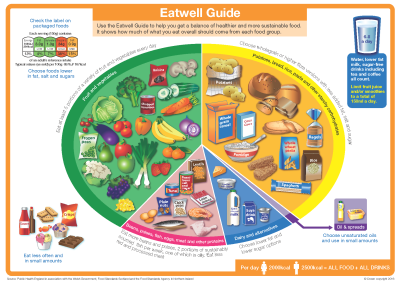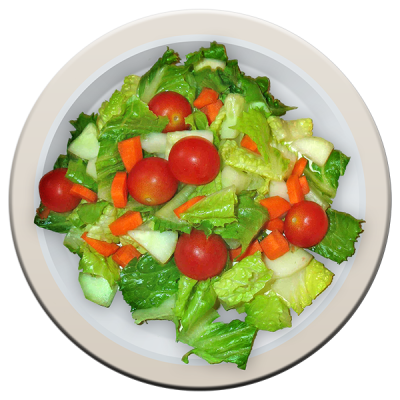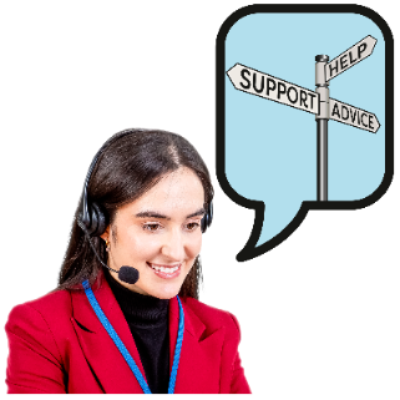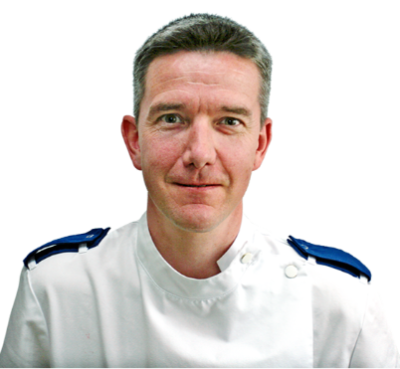About this guide

A member of staff or a carer can support you to read this guide. They will be able to answer any questions that you have.
About this guide
- This guide is for people who want to lose weight and be healthier.
- It will tell you about changes you can make to how you eat and exercise.
- It will tell you where you can go to get help.
Why might I want to change the way I eat and exercise?

Eating healthily is not just about losing weight. It can help you to feel better and be able to do more things.
If you want to lose weight and feel healthy, there are steps you can take to help you succeed.

A lot of people find it hard to stick to a healthy lifestyle.
You might want to write down the reasons you want to do this and what you want to achieve. Some people use pictures as well.
Put this somewhere you can see easily.
You can use this to remind you why you want to make changes to your lifestyle.
You could use this to help you keep going with your change.
How do I start?

Think about your life now and what you want to change.
Start with small changes.
Before you change anything, look at what you do now.
Write down what you eat, drink and when you do exercise.

Keep the diary for a week or two. This will help you to see what kind of food you eat and whether you have a balanced diet – this means the right types of food in the right portion sizes.
It will show if you are getting enough exercise.
It will also show you what might be stopping you living a healthier life.
To help do this, make a list of things that tempt you to eat or drink things you shouldn’t. Also think about what stops your exercising.
It is important to do this at the time when you notice these things happening.

When you have finished your diary, you could think about these questions:
- What has surprised or worried you about what you eat?
- What do you eat? What do you not eat?
- Is there any food you eat lots of?
- How often do you exercise – what do you do and for how long?
- What would you like to change?
Why we put on too much weight

If you don’t move or exercise much in the day, you can feel tired.
When people feel tired, they often eat sugary or fatty snacks or have drinks with caffeine for quick energy.
But the energy you get from eating these kinds of snacks does not last long and can make you feel even more tired.

Keeping your weight healthy means your diet needs to be balanced, portion sizes smaller and you need to move around more.
What can I do to be more healthy?

Healthy eating
You could start by changing the way you eat. Eating in a healthy way is not just about eating less.

You should try to eat lots of different things. You should make sure that you eat a mix of:
Protein – you get this from milk, meat, fish, cheese, eggs, peas, beans and nuts. Protein helps us grow and repair damaged parts of our body

Carbohydrates – you get these from bread, flour, potatoes, cereals, pasta and rice. Carbohydrates keep us warm and give our body energy to do things.

Fats – you get these from butter, cream, nuts and cheese. Fat helps keep us warm and gives our body energy to do things.
Some fats are better than others and lots of foods have fat hidden in them, like cakes and biscuits. You should be careful how much fat you eat.

Vitamins and minerals – these are in a lot of foods we normally eat like meat, fish, fruit, vegetables, pulses and also dairy foods like milk and cheese. We need these to make our bodies work properly.

Fibre – from wholemeal and wholegrain food, fruit, vegetables, beans and nuts. Fibre helps the digestive system work properly.

Fluid – our body needs fluids to work properly. This can come from water, tea, coffee, soft drinks and milk.
Be careful because coffee and tea can dehydrate you and soft drinks such as fruit juice and fizzy drinks contain a lot of sugar.

Fruit and vegetables – these help our body fight diseases and keep healthy. You can eat frozen, fresh or tinned fruits and vegetables.

You can use the Eatwell Plate to help you think about the types of things to eat and how much to have of each type of food.
Healthy eating is about eating regularly. You should eat three meals a day. You can have two or three healthy snacks too. It is important not to eat too much of anything.
What about if I am hungry?

People eat for lots of different reasons – not just because they are hungry. These could be:
- They are bored
- It’s a habit
- Feeling low or depressed
- Covering up feelings
- Or just to join in with other people who are eating.

You could draw a picture or write a list of the reasons why you eat. This might help you to think about when and why you eat and help you to make a plan of how you can change your eating habits.
Keep yourself busy and active and you may well find that hunger pangs pass. If this doesn’t work add another healthy snack.
Your appetite can change day to day and according to the energy you use up. This is normal and means on some days you will need to eat more than on others.
What about diets?

Lots of people try to go on a diet and eat a lot less than they do normally. Nearly everybody puts the weight back on after their diet has finished.

It is better not to diet but to just change the type of food you eat so it is healthier.
You can often eat more of the things that are healthy, not feel hungry and still lose weight.

Having less sugar, fizzy drinks, take-away foods like fish and chips, chocolates and crisps and swapping to eating healthier food is likely to help you lose weight.
Exercise

Exercise can help you to be healthier. Exercise doesn’t have to be going to the gym or going out for a jog. Exercise can be just keeping active and doing things in the house or going out.
You can’t fix a bad diet with exercise alone, so you need to eat healthily and exercise.

These are good ways to exercise but you could start slowly by:
- Doing some gardening.
- Making your own way to the shop instead of getting the bus.
- Doing some jobs around the house, like hoovering.

Everyone should try to do 30 minutes of exercise five times each week. This sounds like a lot, but it doesn’t have to be all in one go. You could do three lots of 10 minutes or two lots of 15 minutes.

You can talk to your doctor or nurse before you start any exercises to make sure that it is OK for you to do them.

Exercise doesn’t need to be hard. It should be just enough to make your heart beat a little faster and for you to feel warmer.
You can slowly do more and make the exercise harder, as long as it is safe for you.
You could spend some time thinking about what exercise you do already and what you would like to be able to do in the future.
Changing the way you think about yourself

Lots of people feel unhappy because they are overweight, very underweight or unhealthy. TV programmes and newspapers show pictures of people who are very thin and people think they should look like them.
Some people are bullied because of the way they look.
Some people are very slim and find it hard to put on weight, and this can make them worried about how they look.
People come in different shapes and sizes, and it is better to feel healthy and feel good about yourself and who you are as a person than to only think about your weight.

It is important to remember that what people say about you doesn’t matter as long as you are happy with yourself.
Lots of people know about food and exercise, but you should check they are properly trained. It is best to ask your doctor or nurse who to trust.
Some people find healthy eating very hard and may have had this problem for many years.
This can be harmful and can make someone too thin or too big.
Being too thin or too big for a long time can have very serious consequences for your health as well as your confidence.
You may need to ask your doctor to refer you to a specialist service that can help with an eating disorder.
Keeping it going

Sometimes it is hard to stick to the changes you have made. It can help to set yourself goals so that when you have achieved something you feel good about doing it.
Take things slowly, one step at time. Don’t try to change lots of things all at once.

Do something nice for yourself when you have reached a goal, as a treat.

Ask your family and friends to help keep you going and let them know when you have achieved a goal, they can help you celebrate it!
Ask friends and family to help you shop for or cook healthy things.
Don’t worry if you make a mistake. Everyone makes mistakes and you shouldn’t let this put you off making the changes to your life.

Keep looking at your diary of what you used to eat and drink to see how many changes you have made.
Where to get more help
If you would like to get more help or information, you can get in touch with these people:
Beat
Information and support for people who have eating disorders.
Telephone: 0808 801 0677
Email: help
www.

Mind Infoline
Help, information and support.
Telephone: 0300 123 3393
Email: info
www.
Rethink
Information and help for anyone who has mental health problems.
Advice Service: 0808 801 0525
Email: advice
www.

You can also get help and information from your doctor or nurse.
Acknowledgement

Easy Read version developed by:
- Skills for People, Telephone: 0191 281 8737Skills for People is a registered charity no. 1069993
- Many thanks to service users and healthcare staff who have contributed to the development of this guide.
Adapted from Food for Thought - A self help booklet published between:
- Northumbria Healthcare NHS Foundation Trust
- Northumberland Care Trust
- Cumbria, Northumberland, Tyne and Wear NHS Foundation Trust www.
selfhelp.cntw.nhs.uk
Published by the Patient Information Centre
2025 Copyright, Cumbria, Northumberland, Tyne and Wear NHS Foundation Trust
Ref, PIC/727/0525 May 2025 V4
Review date 2028
 Print or download as a PDF
Print or download as a PDF